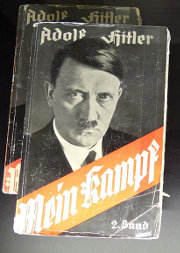 “No, Michael, you are not allowed to sell Mein Kampf. No Paul, I am not going to punish Michael for selling Mein Kampf. Now run along, I’ve got important things to do.”
“No, Michael, you are not allowed to sell Mein Kampf. No Paul, I am not going to punish Michael for selling Mein Kampf. Now run along, I’ve got important things to do.”
That paraphrased is how the court in Amsterdam ruled in the criminal hate speech case against book store owner Michiel van Eyck. As we wrote earlier, Van Eyck was charged with criminal hate speech in June this year after police detectives visited his book store in Amsterdam, the Totalitarian Art Gallery, and confiscated his copy of Mein Kampf.
The court concluded that Van Eyck’s actions differ little from those of the market vendor found guilty by the same court in 1998 for selling a copy of Mein Kampf. The times, they are a-changin’, the judges felt. They pointed out that the text of Mein Kampf is readily available on the Internet (presumably even more so than in 1998) and noted that the copyright on Mein Kampf runs out after 2015. From 2016 on the Dutch government will have even more difficulty controlling the distribution of the work.
Hate speech laws are an exception to the right to free speech. The court had to keep in mind that this exception can only be invoked in case of a ‘pressing social need’. In other words the right to free speech trumps criminal law if the goals of the law aren’t sufficiently advanced by limiting speech.
As a result the court found Van Eyck to be guilty as charged, but at the same time it held Van Eyck to be outside the reach of both prosecution and punishment.
Mein Kampf is the orginal German title of a book by Adolf Hitler. It means My Struggle. The court put Van Eyck’s copy of Mein Kampf with its own files so it doesn’t have to decide what to do with it.
Below are a number of interesting quotes from the verdict with my comments italicized:
- “The book Mein Kampf, consisting of two parts, was confiscated by us in the store at Singel 37 in Amsterdam. It was displayed in a glass case in the store next to other memorabilia.” – (Unnamed detective.)
- “The question is also whether a conviction of the suspect agrees with article 10 ECHR, which protects everybody’s freedom of expression.” Interestingly the Dutch constitution has a similar provision, but courts are not allowed to test the constitution. As a result, the court must ironically fall back on the laws of a body that is hostile to Dutch sovereignty, the Council of Europe.
- “It is a known fact that Mein Kampf is clearly an insulting book to (most of all) Jews and that it incites hatred, discrimination and violence against this group.” This statement by the court seems awkward. If a book incites hatred and discrimination, it is insulting to everybody. The reason why the court uses these precise yet awkward words is simply because it is the insult (of a group) which is punishable by law.
- “[The prosecutor wants Van Eyck’s copy to be removed from circulation, but gives us no legal reason to do so.] Before this session the chair of the court has ordered the prosecutor to enter the copy as evidence. The prosecutor has complied. In doing so the copy of Mein Kampf has become part of the files of this case and is therefore no longer an object that requires this court’s attention.”
(Link: Parool)

 The Totalitarian Art Gallery in Amsterdam lives up to its name and trades in ‘totalitarian memorabilia’.
The Totalitarian Art Gallery in Amsterdam lives up to its name and trades in ‘totalitarian memorabilia’. Usenet community FTD has lost the lawsuit it had started pre-emptively against the Brein foundation to establish that its activities are legal.
Usenet community FTD has lost the lawsuit it had started pre-emptively against the Brein foundation to establish that its activities are legal.